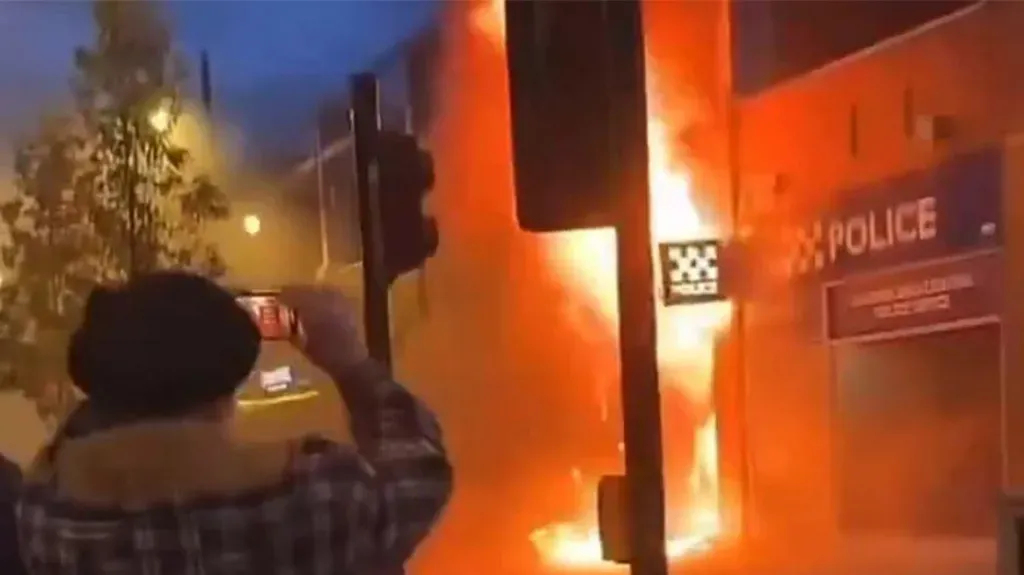Introduction
On a tumultuous Friday night in Sunderland, violence erupted as hundreds of individuals engaged in rioting, leading to significant injuries among police officers and widespread property damage. The unrest, which has stirred considerable concern, follows recent tragic events in Southport. The incidents in Sunderland highlight an ongoing wave of disorder affecting various cities across England, driven by a complex mix of grievances and provocations.
A Night of Chaos: The Riots Unfold
The night of unrest in Sunderland saw police officers facing intense and sustained violence. Northumbria Police reported that three officers were injured and required hospital treatment due to the violent clashes. The situation escalated rapidly as rioters vandalized a police building and set fire to a nearby Citizens Advice premises. The disturbances also included the throwing of beer cans and bricks at riot police, arson against vehicles, and the ignition of a fire near the police office.
The chaos in Sunderland is part of a broader pattern of unrest that has been unfolding across England. The riots have been fueled in part by recent tragic events in Southport, where three young girls were killed earlier in the week. The timing of the riots, combined with the nature of the violence, has intensified public scrutiny and concern.
The Response from Authorities
Northumbria Police Chief Superintendent Helena Barron condemned the violence, describing it as “serious and sustained” and “utterly deplorable.” She emphasized that the authorities are conducting a thorough investigation to identify and prosecute those responsible for the criminal acts. Chief Supt Barron underscored that such violence and disorder would not be tolerated and that efforts would be made to bring those responsible to justice.
Regarding the injured officers, it was reported that one had been discharged from the hospital, while two others remained for further treatment. The severity of the situation was compounded by reports of Islamophobic slurs and chants in support of far-right figures, including Tommy Robinson, a controversial activist known for his association with the disbanded English Defence League (EDL).
The Broader Context
The unrest in Sunderland is part of a disturbing trend of violent protests across the UK. The riots have been exacerbated by misinformation and inflammatory rhetoric. For instance, there were false claims circulating online regarding the identity of the Southport attacker, which contributed to heightened tensions and unrest. These claims have been propagated by figures like Tommy Robinson, further inflaming the situation.
In Sunderland, the presence of masked demonstrators and the deployment of mounted police to manage the crowd highlighted the scale of the violence. Riot police were pelted with beer barrels, and the rioters chanted provocative slogans, such as “Whose streets? Our streets.” The chaotic scenes led to the temporary closure of public transport services, including Tyne and Wear Metro and Sunderland Rail Station, and even forced the closure of local businesses, including the Omniplex cinema.
Community Reactions and Political Responses
The community response to the riots has been one of outrage and condemnation. Mayor Kim McGuinness described the damage inflicted on the city as “significant,” noting the extensive destruction of property and the impact on the local community. She emphasized that such behavior, driven by grief and anger, should be met with the full force of the law.
In a show of solidarity, Sunderland AFC issued a statement condemning the violence and reaffirming the city’s values of togetherness and acceptance. The club’s message reflected a broader sentiment among local residents who wish to distance themselves from the actions of the rioters and emphasize the community’s strength and unity.
Government and Law Enforcement Actions
The British government has responded to the unrest by mobilizing additional resources to address the violence and its underlying causes. Director of Public Prosecutions Stephen Parkinson announced that extra prosecutors had been deployed to handle the influx of cases resulting from the riots. The aim is to ensure swift justice and support the ongoing efforts of the police.
Prime Minister Sir Keir Starmer has also taken decisive action, announcing a new national violent disorder program designed to enhance police coordination and intelligence sharing. In his address, Starmer condemned the violence and emphasized the need for a robust police response to curb the actions of violent groups. The program aims to provide a more agile and responsive approach to managing and preventing similar incidents in the future.
The Ripple Effect Across the UK
Sunderland’s unrest is part of a larger pattern of violent protests that have affected multiple cities in the UK, including London, Hartlepool, Manchester, and Aldershot. The riots have been triggered by a combination of recent violent events, misinformation, and the mobilization of extremist groups. The situation remains fluid, with ongoing planning of demonstrations by far-right activists across the country.
As the UK grapples with these challenges, authorities and communities are working to address the root causes of the unrest and restore order. The focus is on balancing the need for security with the protection of civil liberties and the promotion of social cohesion.
Conclusion
The violent unrest in Sunderland represents a serious challenge for law enforcement and the community. The events of that night have highlighted the tensions and divisions present in society, exacerbated by misinformation and extremist rhetoric. As authorities work to bring those responsible to justice and implement measures to prevent further violence, the community’s resilience and solidarity will be crucial in navigating the path to recovery and reconciliation.
For detailed updates and further information on the ongoing situation in Sunderland, please refer to the source of this news.
Explore More
For further insights into this and other significant events in the UK, please visit our UK section.


